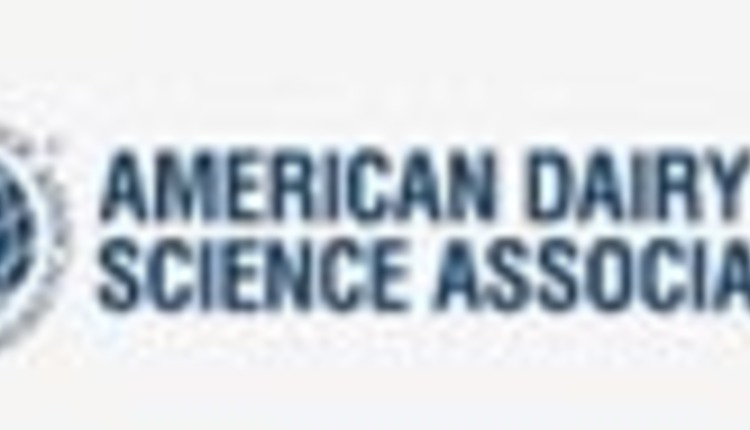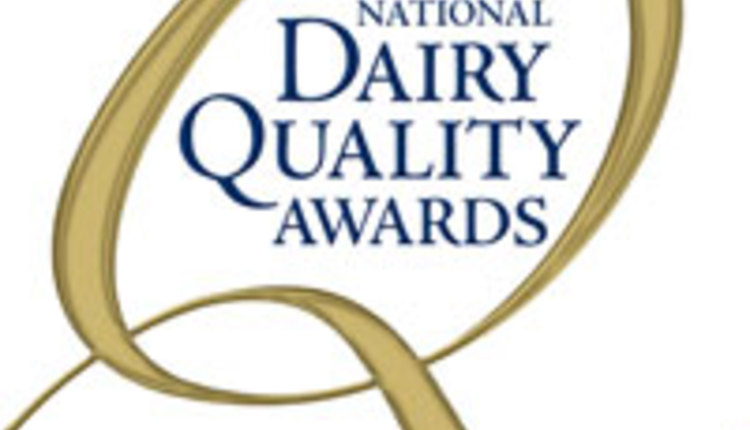
The University of Wisconsin–Madison College of Agricultural and Life Sciences (CALS) recently awarded six, two-year postdoctoral fellowships to help increase dairy-related research capacity through the Dairy Innovation Hub initiative. The selected postdoctoral fellows will tackle research projects in the hub’s four priority areas: stewarding land and water resources; enriching human health and nutrition; ensuring animal health and welfare; and growing farm business and communities.
The Dairy Innovation Hub, which the state of Wisconsin is supporting to the tune of $1 million this year and $7.8 million per year in subsequent years, harnesses research and development at UW–Madison, UW–Platteville and UW–River Falls campuses to keep Wisconsin’s $45.6 billion dairy community at the global forefront in producing nutritious dairy products in an economically, environmentally and socially sustainable manner.
A postdoctoral fellowship is a temporary position in academia for individuals who have already completed their PhD, but who are not yet in a permanent university faculty or industry scientist position. The goal is to gain additional experience and training in a selected research area, while working alongside an experienced faculty member.
“Attracting top talent to Wisconsin to support the state’s robust dairy economy is a critical role for the Dairy Innovation Hub,” says Troy Runge, professor of biological systems engineering, who leads the hub’s UW–Madison campus steering committee. “These six postdoctoral fellows are accomplished professionals in their own right who will work on innovative, groundbreaking research to benefit farmers and citizens in our state and beyond.”
With Dairy Innovation Hub support, CALS recently approved capacity-building equipment purchases and is gearing up to select funding recipients for a set of short-term, high-impact research and outreach projects. In addition, planning is underway for the first faculty and graduate student hires for the hub. More information is at dairyinnovationhub.wisc.edu.
The following UW–Madison postdoctoral fellows were selected for Dairy Innovation Hub funding:
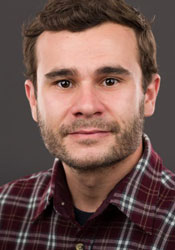
Aaron Gall, Department of Food Science Gall is a postdoctoral research associate in the UW–Madison Department of Food Science. He is currently investigating the mechanisms of host infection of the food-borne pathogen, Listeria monocytogenes.
Project name: The genetic determinants of gastrointestinal tract colonization by Listeria monocytogenes
Project summary: Listeria monocytogenes (Listeria) is a dangerous foodborne pathogen commonly associated with dairy product outbreaks. Listeria infection has remarkably high hospitalization and mortality rates, thus the FDA implements a zero-tolerance policy for Listeria in ready-to-eat products. Listeria is also a common pathogen of dairy animals, such as cattle, sheep and goats. Although most adult cattle have a high tolerance for Listeria infection, this pathogen can cause encephalitis (circling disease), death in young calves and abortion in pregnant animals. Additionally, fecal shedding of Listeria is very common in dairy cattle, who often show no symptoms. This may increase transmission within the herd, particularly compromising susceptible animals. Additionally, shedding increases the likelihood of dairy product contamination with Listeria. This project will evaluate Listeria samples obtained from Wisconsin dairy cows for antibiotic resistance, outbreak potential and environmental persistence, as well as investigate the mechanisms behind cows with Listeria having no symptoms. The findings will inform treatment and intervention strategies to enhance animal health and food safety. This research will be conducted with guidance from Tu-Anh Huynh, assistant professor of food science.
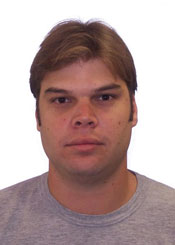
Pedro Monteiro, Department of Animal and Dairy Sciences
Monteiro is a veterinarian by training with experience in reproduction research, dairy cattle management and has direct experience in the dairy industry.
Project name: Improving health and welfare of dairy cattle by synchronizing and optimizing the transition period
Project summary: Calving and transition to lactation increases susceptibility to and incidence of disease in the dairy cow. In dairy and beef farms, calvings occur in a wide range before and after the due date, making calving management a labor-intensive process with monitoring required around the clock. Two types of methods have been used to induce synchronized calving, however, cows that were induced by either method had high incidence of retained placenta. This research will focus on developing a synchronized calving strategy that optimizes the calving management process and the subsequent health and productivity of the lactating cow and her calf. Specifically, how farmers can improve their ability to manage postpartum calcium status and improve reproductive health. This research will be conducted with guidance from Laura Hernandez, associate professor in the animal and dairy sciences department.
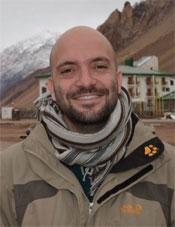
Dario Oliveira, Department of Animal and Dairy Sciences
Oliveira, an electrical engineer by training, was most recently a research staff member with IBM Research in Sao Paulo, Brazil in the area of computer vision and visual understanding.
Project name: Harnessing the power of computer vision systems to improve animal health and welfare in transition dairy cows
Project summary: Nearly all cows will experience negative energy balance in order to support the high energy demands of lactation during the transition period. This can lead to a variety of metabolic disorders. Body condition score is a commonly used tool to monitor and manage these disorders in lactating cows. However, body condition is a periodic, subjective measurement that cannot detect small changes in body shape or composition. Consequently, the development of a computer vision system to assess body condition scores in real-time will play a crucial role to precisely detect changes in body condition. The objective of this project is to develop a platform that uses sensors for real-time detection of body shape and animal behavior. Results will be used for precise and early detection of metabolic disorders and associated health problems. This research will be conducted with guidance from Joao Dorea, assistant professor in the animal and dairy sciences department.

Ruma Raghuvanshi, Department of Food Science
Raghuvanshi recently completed a postdoctoral fellowship focused on microbiome and metabolomics research in the Department of Biochemistry at Michigan State University.
Project name: Whey-fortified fermented milk for inhibiting intestinal inflammation
Project summary: Fermented milk products (FMPs) such as yogurts and kefir are increasing in popularity in the U.S. While consumer acceptance of the established health-promoting properties of FMPs is increasing, it’s not fully understood how FMPs promote health. With a better understanding of these products and their health benefits, it is expected that the food industry will be able to produce FMPs with improved health-promoting properties and consumer appeal. The objective of this project is to determine how FMPs regulate gut inflammation and how they could help prevent chronic systemic inflammation. This research will be conducted with guidance from Brad Bolling, professor of food science.
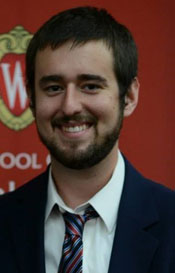
Joseph Sandord, Department of Biological Systems Engineering
Sanford received a PhD in biological systems engineering with a minor in soil science from the UW–Madison in 2019. His research focus is on management and treatment of agricultural wastewater and manure management.
Project name: Efficacy of manure nutrient prediction and variable rate technology to improve nutrient use efficiency on Wisconsin dairy farms
Project summary: Manure is a valuable resource for maintaining soil fertility on Wisconsin dairy farms. However, over-application causes soils to become saturated with nutrients, which can lead to surface and groundwater contamination. On-spreader manure nutrient prediction and variable rate application are promising new technologies that could minimize environmental risk while improving utilization of manure as a plant nutrient source. This project will assess the efficacy of the underlying technologies of current and novel precision nutrient application systems. This research will be conducted with guidance from Matthew Digman, assistant professor of biological systems engineering.
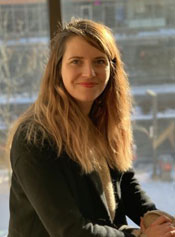
Susanne Wiesner, Department of Biological Systems Engineering
Wiesner recently completed a postdoctoral fellowship working at the U.S. Dairy Forage Research Center in Madison, Wisconsin. Her research combines remote sensing data, field sampling and computer models to understand the relationships between carbon, water and energy with the goal of improving environmental sustainability.
Project name: Reducing lifecycle environmental impacts and improving profitability of Wisconsin dairy systems through improved cropping management
Project summary: Agricultural soils are continuously degrading and about 70% of the carbon of agricultural soils has been lost worldwide due to soil erosion and unsustainable management practices. This project will assess innovation opportunities that increase profit and enhance environmental stewardship on Wisconsin's dairy farms by altering cropping sequences and nutrient management, while sustaining biomass yields for dairy feed and milk production, lowering external inputs, and improving profits through credits for ecosystem services. The goal is to assess environmental and economic outcomes associated with transitions of traditional dairy cropping systems to greater cropping diversities using cover crops, intercropping and perennials. This research will be conducted with guidance from Paul Stoy, associate professor of biological systems engineering.
